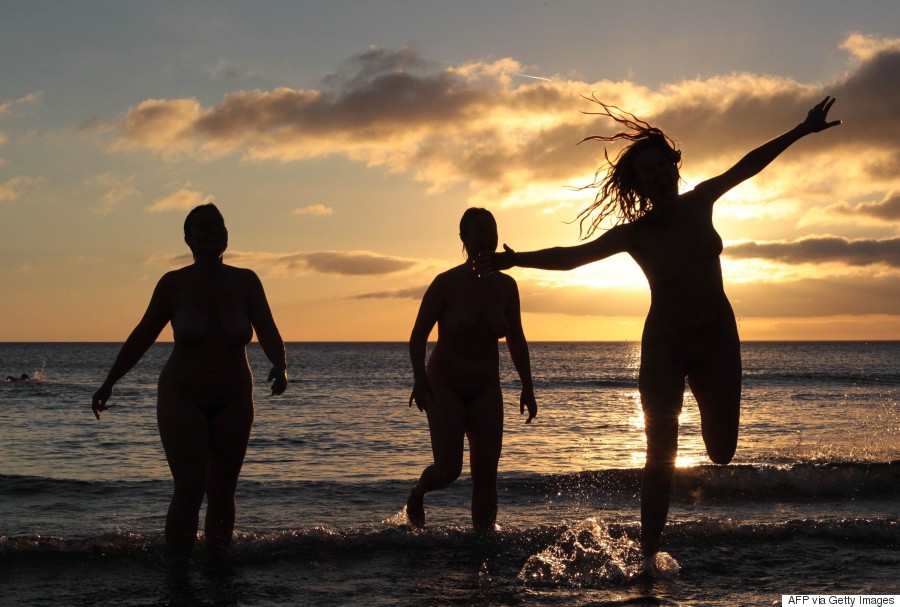
“The thing you don't realize is that there's good naked and bad naked,” complains Jerry to George in the “Seinfeld” episode “The Apology.” “Naked hair brushing, good; naked crouching, bad.”
In the episode, Jerry’s beautiful new girlfriend has a proclivity for hanging out naked, and it turns out he doesn’t always love it.
The genius of this storyline lies in its relatability: There’s good naked, and there’s bad naked, and even if the distinctions seem unfair or irrational, most of us automatically recognize them. Generally we like to associate nudity with seductive moments rather than opening pickle jars or belt-sanding the floor.
Except for real, true-blue social naturists. Why are they down with "bad" naked as well as "good" naked? And why does naturism, or nudism, remain so marginalized in American society today?
This month, two books -- one nonfiction, one novel -- put the spotlight on the consciously unclothed, and challenge us all not to look away. Naked at Lunch: A Reluctant Nudist’s Adventures in the Clothing-Optional World details Mark Haskell Smith’s journalistic experimentation in the world of social naturism, with a healthy dose of historical background on the movement mixed in. In The Nakeds, a novel by Lisa Glatt, the titular nakeds are Nina Teller, a divorcée with a daughter who’s in perpetual recovery after a devastating car injury, and Azeem, Nina’s second husband. Azeem, an Arab grad student, studies sexuality, and in 1970s California, he’s primed to take advantage of the sexual revolution, first by introducing Nina to a nudist club, The Elysium.
A nonfiction, reportorial take on an alternative lifestyle might seem likely to be the more skeptical of the two, but Haskell Smith is nothing if not game for whatever. He describes himself as a reluctant nudist; prior to beginning research on the book, he hadn’t dabbled in the fine art of hanging out with others while naked. Nonetheless, he seems to acclimate quickly, relishing the feel of a light breeze across his exposed epidermis as he lounges on a nude beach, eagerly nodding as activists explain the multitudinous benefits of nudism.
“If you just drop trou and walk a hundred yards out in the woods, you’ll feel closer to nature,” prominent naturist Mark Storey tells Haskell Smith. “Social nudity can reduce alienation.”
Haskell Smith totally groks this. As a socially anxious introvert, on the other hand, I question how desirable this is. On an idealistic level, reduced alienation sounds inherently desirable, but I find alienation-reducing schemes often result in overstimulation to the point of emotional breakdown. Communal living set-ups? Everyone involved seems really happy, but I can barely handle the lack of private time for a brief visit. Frequent social touching? Please don’t. I once sobbed on the phone to my boyfriend because I’d been sharing a hotel room with two co-workers for a few days -- co-workers I really enjoyed spending time with, generally speaking. A little more alienation sounded A-OK to me at that point, and we were wearing clothes. Mostly.
So, as a self-professed Jerry, it is possible to reconcile a naturist point of view?
Fabric-Free in the Name of Body Love?
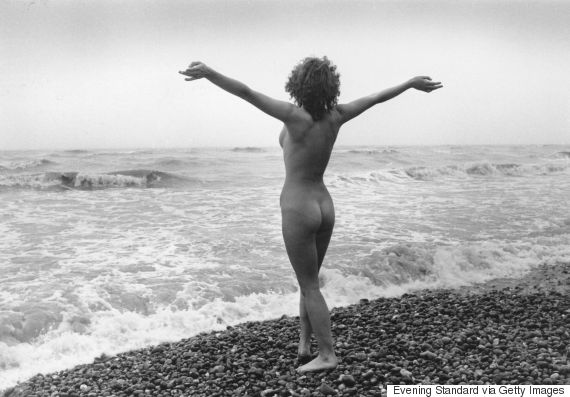
A nudist surveys the sea on the Brighton sea front. Evening Standard/Getty Images.
Several nudists in Naked at Lunch trumpet body acceptance for all as a benefit of going fabric-free. Richard Foley, a so-called Naktivist who leads nude walking tours, mentions a skin condition that he’s felt less self-conscious about since stripping down: “I think that being naked has helped me deal with that in a more positive way because I’m less concerned about what other people think.”
As a certified feminist™, I see the value in making our real bodies more visible. If the only naked bodies most of us see with regularity are movie stars' with personal trainers, carb-free diets and Photoshoppers, our own unclothed forms seem more and more monstrous and misshapen. “Naturism is a great antidote to all the messages [women] get from the media that they’re not good enough, too fat, too wrinkled, too old, etc.,” argued the co-founder of Young Naturists America, who goes by the pseudonym Felicity Jones, to Haskell Smith.
So sunlight is the best disinfectant -- perhaps a motto for body image activists as well as muckraking journalists. Social naturists, especially younger ones, have promoted this benefit, but you actually don’t have to be one to embrace their approach to counteracting body negativity. Women artists have embraced selfie series and photography exhibits that spotlight a broader range of bodies -- older or fatter than what the media will show, or marked by stretch marks or surgery scars. Trending hashtags like #freethenipple and #leakforjlaw have encouraged women to post topless or naked photos of their un-airbrushed bodies on Instagram and Twitter. Social media’s platform is perfectly designed to propel such visibility-focused grassroots campaigns.
And, as Jones pointed out, maybe this increasingly casual presence of nudity on social media will ease the eventual acceptance of naturism: “More and more people will have photos of their boobs coming up online, and maybe at some point no one will think anything of it. So then who cares about the photo of So-and-So on a nude beach.” Haskell Smith, for his part, says it’s “the first time [he’s] heard a positive spin put on naked selfies and sexting,” but not because it’s a brand-new argument.
Nudists aren’t the only ones hoping for a less buttoned-up culture as the silver lining on the naked selfie online leak trend. After the celebrity nude photo hacking scandal last year, Buzzfeed’s Anne Helen Petersen pointed out that while the victims' privacy unequivocally should have been respected, this wave of nude leaks occasioned far less slut-shaming than previous ones. “The acknowledgement that twentysomething females are sexual beings just might predicate a more balanced and less Puritanical understanding of female sexuality,” Petersen wrote.
No Shirt, No Shoes, No Sexual Exploitation?
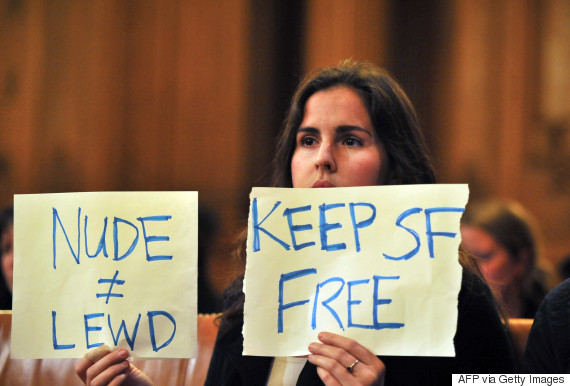
Tailor Whitfield holds up a sign during a Board of Supervisors meeting in San Francisco's City Hall on November 20, 2012. San Francisco lawmakers voted to outlaw most public nudity, despite protests in the famously free and easy California city -- including a naked demo outside City Hall. Josh Edelson/AFP/Getty Images
General body positivity aside, there could be profound sexual effects to simply taking our clothes off. Haskell Smith is high on the movement’s power to eliminate the potentially creepy aspect of nakedness, but his treatment of how social nudism relates to sexuality and sexual objectification feels particularly conflicted.
Naturists, as he documents, have long struggled to establish that their nudity is non-sexual. Clubs and resorts frequently emphasize codes of conduct banning erections and sexual behavior of any kind. Plus, the visual onslaught of genitals and tummies and butts seems to have something of a numbing effect, he argues, making the sight less sexual than nudity in more select circumstances. He claims to quickly grow desensitized to the naked bodies all around him at nudist clubs, only noticing one attractive woman after she gets dressed.
But Haskell Smith also hints at a lighthearted objectification of women that thrives around the nudist community and movement, perhaps contributing to their constituting a smaller percentage of nudists than men. A 62-year-old man Haskell Smith met on a nudist cruise obsessively photographed women’s genitalia (with permission) and whined that the cruisers were too old. On a naked hike, with a group that included “a number of attractive women,” Haskell Smith noticed many passersby taking photographs of them.
He also mentions New York City’s Outdoor Co-ed Topless Pulp Fiction Appreciation Society, a book club that makes use of the city’s gender-neutral toplessness law. “The accounts of their exploits are fun to read and the photos of lithe young women in the city are compelling,” he writes. They certainly are! HuffPost’s annual slideshow of their yearly Central Park reading group draws in clicks by the bushel, presumably not from passionate nudists, nor from book club fans. Of course, these women have chosen to participate, and they shouldn’t be ashamed of it, but to pretend that sexual objectification, especially of women by straight men, isn’t an aspect of such nudism seems untenable.
Conversely, removing the erotic aspect of erogenous zones by simply exposing them at all times seems of questionable desirability. He quotes Italian philosopher Mario Perniola, who argued, “Eroticism appears as a relationship between clothing and nudity. Therefore, it is conditional on the possibility of movement -- transit -- from one state to the other.” Basically, having some clothing on means that you could take it off. Fashion designer Erica Davies hints at the advantage of covering up: “Less is more [...] I’ll kind of cover the body a lot. For me, it’s like when I see too much skin it kind of repulses me. It doesn’t give me the feeling of sexiness.”
Some religions and cultures take it further. Rabbi Shmuley Boteach argued in an interview with New York Magazine that Orthodox Jews have better sex lives thanks to their stricter dress codes, which include covered hair for women. “The average Western couples are left with only three erogenous zones,” he pointed out. “In Orthodox Jewish circles, you have others, like the woman’s hair [usually covered]. Hair is one of the sexiest things around.” While we wouldn’t all want to sacrifice tank tops and uncovered hair to the cause, it’s a tradeoff that some apparently consider worthwhile.
For me, I’d like to keep at least the traditional Western ones. Haskell Smith suggests it’s as simple as throwing on a fetish outfit prior to hooking up, as swingers at the nudist resort Cap d’Agde do, but can such a simple costume really reignite that previously squelched eroticism for all of us?
But What About The Children?
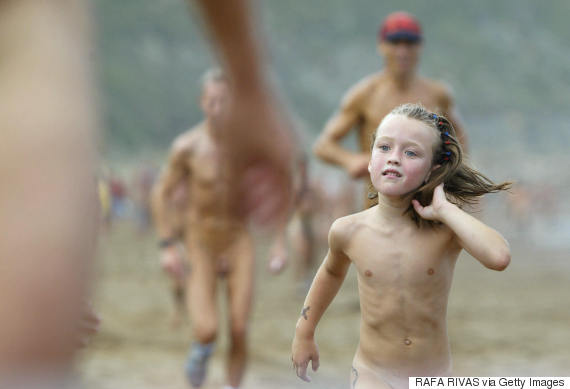
A girl takes part in the Patxi Ros nudist cross-country race, 15 September 2007 on the beach in Sopelana. RAFA RIVAS/AFP/Getty Images.
Haskell Smith generally takes the position that nudism, even if it offends us, is a right, not a privilege. But even some nudists believe in limiting the nude socializing to consenting groups, such as a nudist club or beach, as he notes in the book. If nudism is nonsexual, it’s difficult to argue that consent is needed, but the line between sexual and nonsexual nudity can also be tricky.
For example, he talks to the councilman who pushed a controversial nudity ban in San Francisco in 2013, and is told the council was driven to action by growing groups of naked men wearing cock rings parading outside elementary schools and children’s theaters, or waving their penises at passing cars. One woman described a naked man repeatedly walking by her group of Girl Scouts as they sold cookies.
Some of these behaviors feel less social than hostile, even sexually aggressive. The nudity ban, which seems to undermine the city’s free-and-easy vibe, makes more sense given the circumstances. But at what point, exactly, does their nakedness cross over from allowable to lewd? When should we just get consent from all participants?
Hannah Teller, the young daughter of Nina and Asher Teller in The Nakeds, grows up without the option of nudity, even if she wants it. She’s just six years old when she’s hit by a drunk driver while walking to school, and the devastating leg injury inflicted on her seems to resist full rehabilitation. For the next ten years, she exchanges one cast for another, then that one for a brace, an endless rotation of leg-obscuring wraps. Her parents divorce, and when Nina marries Azeem, Hannah is bemused by his more outré interests. When Hannah refuses to join Azeem and Nina at their nudist camp, they tell her they’ll “bring the camp to you.” On Fridays, her mother and stepfather roam the house unclothed, while awkward tween Hannah, in her perpetual toe-to-groin cast, avoids eye contact.
“The human body is a beautiful thing,” Nina tells her daughter. “We’re not ashamed.”
“It’s not about you,” retorts Hannah.
Very little in the household seems to be about Hannah, a problem highlighted by her mother's disregard for her. A self-conscious adolescent, Hannah has her own complex feelings about being confronted with so much nakedity at a time when her body is changing, and when so much of it is still hidden from her. “[T]he one thing Hannah could not see was her own body -- at least not all at once. There was her leg covered up with plaster, sometimes to the knee, but today to her crotch,” writes Glatt. “Unlike her mom and Azeem, she was never naked.”
Haskell Smith tells a similar story, interviewing a friend whose mom and stepdad got into nudism while she was young. “I just didn’t see why everybody needed to see me completely naked,” she told him. “You got used to it on some level, but I didn’t like it.”
Several of the nudists he spoke to have adult children who grew up in the nudist community but are now textile-only. The teenage years seem to be a common time for reversion to the protective armor of clothing. At Hotel Vera Playa Club, a naturist resort in southern Spain, Haskell Smith noticed more families than he’d expected, but that the younger members didn’t fully embrace the nudist credo: “The little kids and preteens seemed evenly split between wearing swimsuits and going nude, but the teenagers -- hyper self-conscious -- piled on as many clothes as they could.” No kidding. My inner teen is aflame with imagined embarrassment right now.
So, without being all “what about the children” -- what ABOUT the children? And all other non-consenting participants? Should we, as Haskell Smith suggests, just “grow the fuck up”? What about textiles who are actually children?
There’s an idealistic sense in Naked at Lunch that nothing worse could result from universal social naturism than some hilarious awkward situations. Haskell Smith’s jaunty tone and self-proclaimed hedonistic moral code nudges us toward a pro-nudity position. In Glatt’s fictional portrayal, the darker corners merit more serious consideration. Hannah’s discomfort with her parents’ openness may be the result of mere social conditioning, and dissatisfaction with her own body, but the pain that it causes her is real nonetheless -- and, as their dependent, she’s unable to withhold consent or escape it.
It's Getting Hot In Here: Should We Take Off All Our Clothes?
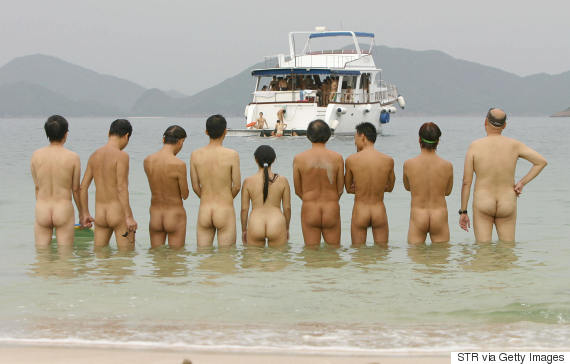
A group of nudists on a beach on a relatively remote island to the North East of Hong Kong 14 June 2005. STR/AFP/Getty Images.
If nudism were common in American society, it might eliminate these issues. As what nudists would call a "textile," or Haskell Smith might term a “prude,” I find it hard to imagine ever feeling fully comfortable, but familiarity breeds acceptance. Forcing such a transition, however, is a far trickier matter. Decoupling nudity from sex can’t be done quickly or painlessly, especially if not everyone wants to. And as long as the two go hand-in-hand for most Americans, being unexpectedly or forcibly confronted with nudity will leave many with feelings of distaste.
Haskell Smith grows rather judgmental toward the clothed as he progresses in his research. The word “prudish” makes repeated appearances to dismiss people who don’t enjoy being socially nude or in socially nude contexts. He gives himself and his wife a pass on the prudishness, despite their own previous distaste for this social milieu, perhaps because he’s able to understand their own discomfort with it. For all his ability to put himself in the shoes, or lack thereof, of naturists throughout the book, his empathy toward textiles is sorely lacking.
Without a broader perspective, Haskell Smith’s prerogative verges on the idealistic. Most Americans love the idea of personal freedom and self-determination, but in practice, we’re also uncomfortable with nudging the doors open for sexually aggressive behavior. When the line appears different to so many of us, and so difficult to define, how do we litigate what is acceptable?
Many of the exact aspects Haskell Smith found “refreshing” -- such as an exhibitionist waving around his penis, enhanced with a manual pump, at beach-goers -- strike me as violating and undesirable. The San Francisco debate faced similar obstructions. Many longtime locals felt comfortable with casual nudism cropping up here and there in their neighborhood, but bridled when their living space became a hangout spot for posses of men clad only in cock rings. Others still felt this mischief wasn’t sufficient to merit a ban.
Haskell Smith himself asks, “Is a grown man waving his dick at a car offensive?” His conclusion: “Maybe.” Of course, if you’re the parent of a small child in The Castro, or a young woman with a history of sexual assault, you might feel differently about the offensiveness than Haskell Smith, a middle-aged man -- yet we approach the offensiveness debate primarily from his perspective throughout.
This approach leaves mostly unexamined the predominance of men in the nudist community. Statistics on the actual ratio are elusive, but personal accounts of clubs and resorts tend to note a significant skew toward men. Some attempt to combat this by barring single men or married men without their wives, a policy Haskell Smith found merely frustrating. “As if married men weren’t just as capable of gawking and leering at naked women as single men,” he scoffed. Perhaps so, but if many nudist single women feel ill at ease being surrounded by naked men on the prowl, he might concede that they likely have their reasons.
Haskell Smith gives very little credence to the idea that women might feel at all uneasy around a passel of unclothed men, especially men looking for a hook-up. He asks one fellow nude hiker, Conxita, if she ever felt sexually objectified, and she demurs: “I never had the thought of I’m going to be raped in the shower.”
Aside from the fact that there’s a wide gulf between not feeling objectified and fearing you’ll be raped in the shower, Conxita’s statement provides a pat counterpoint to fears of sexual unease in these settings. Haskell Smith reasons, “Even if they were attracted to Conxita, no one could act aggressively sexual, as it would’ve made all the women in the hut -- and possibly some of the men -- uncomfortable.” If only it took such a little thing as women’s discomfort for men to refrain from ever acting aggressively sexual, this might read as convincing.
On the other hand, here’s a Vice article about a male journalist, Sam Briggs, who went to a nudist resort and found himself being flirted with by an older gentleman: “I’m straight, though all for a cheeky harmless flirt, but there was only vapour between me and his advances. I felt a little vulnerable.” I can’t say I’m surprised he was longing for a pair of pants during this encounter.
Naked at Lunch explores naturism in America and across Western Europe; it delves into the archives to document the birth of nudist movements and touches on flashpoints of controversy for the movement. Despite this thoroughness, it’s a work of fiction -- Glatt’s The Nakeds -- that more wholeheartedly plunges into the murky stew of social conditioning, the problems of consent, and the varied outcomes and manifestations of nudism that real-world practice entails. Haskell Smith offers a bubbly optimism that plays to our American sense of idealistic individualism: Why can’t we all just take off our clothes, and let others take off their clothes, and reap the benefits?
But taking off your clothes is far too simple of an act to be an antidote to so many deeply ingrained social norms. In The Nakeds, it doesn’t make Azeem less driven by his sexual appetite or his desire to sleep with other women, nor does it make Hannah feel sudden acceptance for her teenage body. Though Nina enjoys it purely, she has to ignore the consequences for her daughter to do so. At the end of the experiment, Haskell Smith admits it’s not that simple for him either: “I wasn’t a nudist when I started this journey and, if I’m being truthful, I’m not a nudist or a naturist or an anti-textile now,” he writes. “They’re just not my scene.”
It’s nice to think that, in a perfect world, it could all be as simple as just taking our clothes off. But we don’t live in that world. At least not yet.
